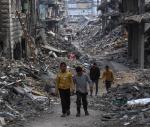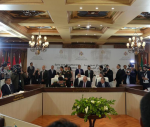You are here
Monitoring centre ‘actively watching de-escalation zone’
By Mohammad Ghazal - Jun 11,2018 - Last updated at Jun 11,2018
AMMAN — A Jordanian-American-Russian monitoring centre is operating in Amman to monitor any violations to a ceasefire in the de-escalation zone, which was created in south Syria last year, Minister of Foreign Affairs in the caretaker government Ayman Safadi said on Sunday.
The centre is "monitoring and dealing with these violations effectively", Safadi told reporters during a joint press conference with EU High Representative for Foreign Affairs and Security Policy Federica Mogherini.
The minister said Jordan had started intensive talks with the US and Russia on the need to preserve the de-escalation zone created in the south of Syria following last year's tripartite deal among the three sides.
"The zone is a necessity and an important step to reach a political solution… All parties are committed to preserving the deal as they all know its feasibility and that it helped in reaching a ceasefire," Safadi said, adding that maintaining the zone will help end the crisis in Syria and work out a political solution that ensure that the bloodshed, chaos and destruction are ceased.
"Many voiced concern about the eruption of violence in south Syria and we say that no one will benefit from violence…. We in Jordan are closely following up on the situation," he said.
“We do not want to see any violence in the south of Syria…We do not want to see more Syrians losing homes and being forced to leave and immigrate and thus we will work on preserving this agreement in cooperation with our direct partners in the deal and other regional and international partners,” he added.
Mogherini stressed the EU’s support for efforts preserve the zone.
“We support efforts to maintain the de-escalation zone. We have all interest to maintain the zone in the south of Syria for the stability and security of Jordan and the Jordanian people,” said Mogherini.
The tripartite deal, which was signed in Amman last year, entailed a ceasefire along a line of contact agreed upon between Syrian government forces and associated troops on one side and rebels on the other.
The three parties agreed that the ceasefire aims to permanently de-escalate the tensions in southern Syria, ending acts of hostility, restoring stability and allowing free access of humanitarian aid for this key area in Syria.
Government officials said then that the deal was key for uprooting terrorist groups such as the so-called Khalid Ibn Al Walid Army, Al Nusra and any pockets affiliated with Daesh near the borders.
Related Articles
AMMAN — Jordan said on Tuesday it was coordinating with the US an emergency meeting to be held in the Kingdom over reports of violations to
AMMAN — Jordan is closely following up on developments in the south of Syria, a government official said on Monday.“We are monitoring the de
AMMAN — The Foreign Ministry on Friday stressed the importance of preserving the de-escalation zone in southwestern Syria to stop the bloods
















